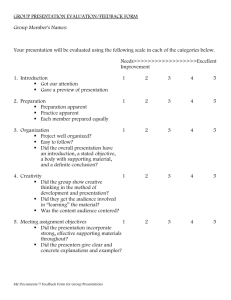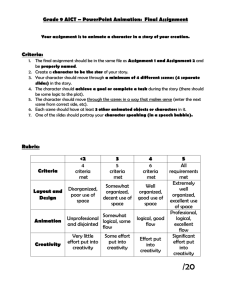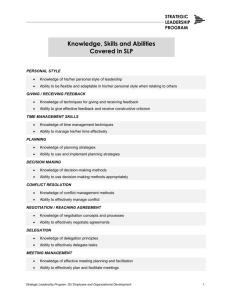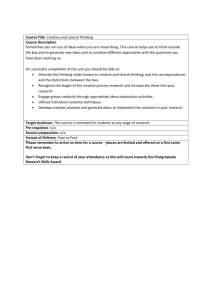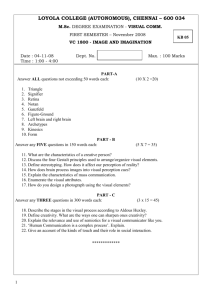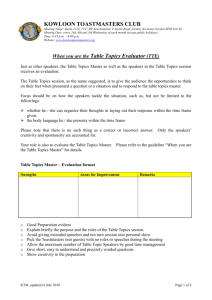apr07_icp_conference
advertisement
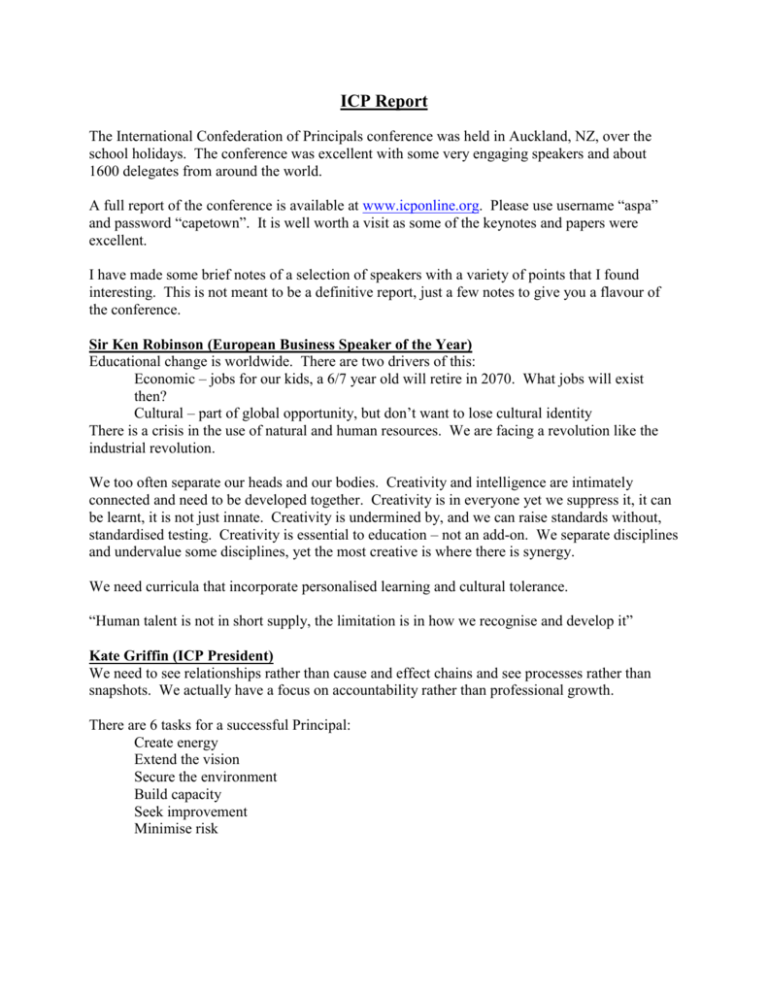
ICP Report The International Confederation of Principals conference was held in Auckland, NZ, over the school holidays. The conference was excellent with some very engaging speakers and about 1600 delegates from around the world. A full report of the conference is available at www.icponline.org. Please use username “aspa” and password “capetown”. It is well worth a visit as some of the keynotes and papers were excellent. I have made some brief notes of a selection of speakers with a variety of points that I found interesting. This is not meant to be a definitive report, just a few notes to give you a flavour of the conference. Sir Ken Robinson (European Business Speaker of the Year) Educational change is worldwide. There are two drivers of this: Economic – jobs for our kids, a 6/7 year old will retire in 2070. What jobs will exist then? Cultural – part of global opportunity, but don’t want to lose cultural identity There is a crisis in the use of natural and human resources. We are facing a revolution like the industrial revolution. We too often separate our heads and our bodies. Creativity and intelligence are intimately connected and need to be developed together. Creativity is in everyone yet we suppress it, it can be learnt, it is not just innate. Creativity is undermined by, and we can raise standards without, standardised testing. Creativity is essential to education – not an add-on. We separate disciplines and undervalue some disciplines, yet the most creative is where there is synergy. We need curricula that incorporate personalised learning and cultural tolerance. “Human talent is not in short supply, the limitation is in how we recognise and develop it” Kate Griffin (ICP President) We need to see relationships rather than cause and effect chains and see processes rather than snapshots. We actually have a focus on accountability rather than professional growth. There are 6 tasks for a successful Principal: Create energy Extend the vision Secure the environment Build capacity Seek improvement Minimise risk Dr John Hood (VC University of Oxford) Leaders do make a difference: Establish goals and expectations – by consensus Strategic resourcing – e.g. staff to support goals Planning, co-ordination and evaluation of teaching and curriculum – collaboration, feedback to staff, data on student performance Promoting and participating in teacher professional development Orderly and supportive environment – students and between staff Relationships are integral to all – “how” we do things is just as important as “what” we do. Implications Build relationships through collaborative focus on teaching and learning Develop leadership expertise in pedagogy, curriculum and assessment. Educational leadership is not business leadership Steve Maharey (NZ Minister of Education) The aim is to have active rather than passive learners. Assessing students on an A to E scale in age related cohorts is so last century. The learner used to have to fit the demands of the system, now the system must fit the needs of the learner. Spoke about Richard Taylor and the WATA workshops (Lord of the Rings etc) who has said that the failures from school are his best people – the ones who used to graffiti their books. Conventional education only looks for certain sorts of ability. Dr Todd Whitaker (Prof of Ed Leadership - Indiana State Univ.) The worse the news delivered the more effort needed in the delivery. There is nothing wrong with being afraid, only in acting afraid. Be very clear on what is the purpose, will this action fulfil the purpose and what will my best people think? Too often we only think about what the worst people think. Treat people as though they are good. If there is an issue with a teacher, deal with it in your time not in their time. A good mantra is: “I am telling you this because if it was me I would want to know.” “Raise the praise, minimise the criticise”. Praise needs to be authentic, specific, immediate, clean, and private. Pip Woodward (University of Auckland) Professional isolation is a significant cause of stress and burnout. We need to be conscious of the mental, physical, social and spiritual parts of ourselves. We need to plan and make a commitment in each of these areas for our own health. Our focus needs to be on growing our strengths not obsessing about our weaknesses. Everyone needs to feel secure, connected and valued. Professor Lester Levy (CEO NZ Leadership Institute – University of Auckland) Nine out of ten people have an incorrect view of themselves. A sense of self is critical to leadership. Authentic leadership is based in honesty and truth: Self-awareness Balanced processing (i.e. feedback) Transparency Moral and ethical perspectives Not just what we do but how we do it Followers want from their leaders Authenticity Significance (participative and collaborative decision-making) Excitement and energy Community (sense of belonging) Leadership is about empowering others. Management is about the now, leadership is about the future. Management is often the default position. Imagine someone sitting in the chair opposite you and asking themselves the question: “Why would I want to be led by you?” Mark Treadwell (Author) Has a book called “Whatever”. We are moving from book based to internet based paradigm. The effectiveness of education has not improved since the sixties despite a 2.5 times increase in funding – US report. We are moving from an industrial sector to a services sector, therefore we need a new skill set e.g. oral language needs to be taught along with literacy and numeracy. Also we have the rise of the creative sector. First time in history that resources can be individual via the internet. Internet provides a cheaper access point to knowledge, if not to understanding. It is a great opportunity to teach for understanding using web based environments. Kids need to be taught to be wise not just be knowledgeable – teach for understanding not for knowing. Li Cunxin (Ballet dancer, stockbroker) Li was a truly inspirational speaker who wrote the book “Mao’s Last Dancer”. His message was to grasp opportunities when they arise and that nothing comes without hard work, persistence and determination. The full text is on the website and worth a read. Simon Lamb (Principal) There are 5 drivers of (educational) change: Demographic – aging Social – change in family Technology Economic – higher living standards Environmental Fast school mirrors the fast food style of life. It is based on testing and standards with content based tests and an emphasis on outcomes. In the slow school the focus is on the person and their learning with an emphasis on process. The teacher needs to model learning. At Takapurna High Personal excellence is achieved through knowing, connecting, relating, supporting. These form strong common beliefs – amongst teachers and students. Older students teach the younger students about the schools philosophy. The school runs PD every Wednesday morning – usually programs by their own staff for their own staff. They find this the most powerful. Two students spoke about the school. They indicated that lessons are focussed on the individual and are fun. For example, speed dating in French as a way of learning the language. They spoke about a program based around how to learn with a focus on deep understanding. Dr. Michael Schartz (Prof of Education – University of Innsbruck) A system can only see what it can see. It cannot see what it cannot see. Also it doesn’t know it can’t see what it can’t see. It sounds “Rumsfeldish”, but makes sense if you think about it! Working only on the structures is like rattling the chook shed. The chooks will get stirred up and then eventually settle right back where they were. Therefore we need to work on the structures and the people to make lasting change. Snippets from various speakers Bugger the boxing, pour the concrete. (i.e. you can’t always have everything in place before you act). Leadership is the art of keeping the herd roughly heading West. Sometimes it is important to have the courage of error. Focus on the user and all else will follow - Google Maori saying: “The child is the heart of the matter”. “It’s not attention deficit, I’m just not listening” – T-shirt on teenager “I’ve got ethics and morals, and if you don’t like them I’ve got others” Groucho Marks “The trouble with learning is that it’s about something you don’t know” – Charlie Brown “Vision without action is a daydream, action without vision is a nightmare” – Japanese proverb
